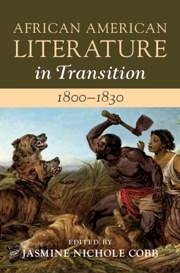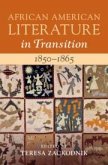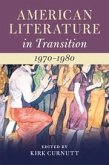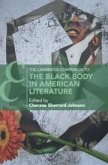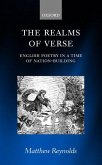African American Literature in Transition, 1800-1830: Volume 2, 1800-1830
Herausgeber: Cobb, Jasmine Nichole
African American Literature in Transition, 1800-1830: Volume 2, 1800-1830
Herausgeber: Cobb, Jasmine Nichole
- Gebundenes Buch
- Merkliste
- Auf die Merkliste
- Bewerten Bewerten
- Teilen
- Produkt teilen
- Produkterinnerung
- Produkterinnerung
This volume considers texts produced between 1800 and 1830, exploring themes such as print culture, Illustration and the narrative form.
Andere Kunden interessierten sich auch für
![African American Literature in Transition, 1850-1865: Volume 4, 1850-1865 African American Literature in Transition, 1850-1865: Volume 4, 1850-1865]() African American Literature in Transition, 1850-1865: Volume 4, 1850-1865139,99 €
African American Literature in Transition, 1850-1865: Volume 4, 1850-1865139,99 €![American Literature in Transition, 1970-1980 American Literature in Transition, 1970-1980]() American Literature in Transition, 1970-1980149,99 €
American Literature in Transition, 1970-1980149,99 €![The Cambridge Companion to the Black Body in American Literature The Cambridge Companion to the Black Body in American Literature]() The Cambridge Companion to the Black Body in American Literature105,99 €
The Cambridge Companion to the Black Body in American Literature105,99 €![Women and Literature in Britain 1800 1900 Women and Literature in Britain 1800 1900]() Joanne Shattock (ed.)Women and Literature in Britain 1800 190048,99 €
Joanne Shattock (ed.)Women and Literature in Britain 1800 190048,99 €![A History of American Literature and Culture of the First World War A History of American Literature and Culture of the First World War]() A History of American Literature and Culture of the First World War152,99 €
A History of American Literature and Culture of the First World War152,99 €![English Fiction of the Romantic Period 1789-1830 English Fiction of the Romantic Period 1789-1830]() Gary KellyEnglish Fiction of the Romantic Period 1789-1830197,99 €
Gary KellyEnglish Fiction of the Romantic Period 1789-1830197,99 €![The Realms of Verse 1830-1870 The Realms of Verse 1830-1870]() Matthew ReynoldsThe Realms of Verse 1830-187089,99 €
Matthew ReynoldsThe Realms of Verse 1830-187089,99 €-
-
-
This volume considers texts produced between 1800 and 1830, exploring themes such as print culture, Illustration and the narrative form.
Hinweis: Dieser Artikel kann nur an eine deutsche Lieferadresse ausgeliefert werden.
Hinweis: Dieser Artikel kann nur an eine deutsche Lieferadresse ausgeliefert werden.
Produktdetails
- Produktdetails
- Verlag: Cambridge University Press
- Seitenzahl: 366
- Erscheinungstermin: 8. Juli 2021
- Englisch
- Abmessung: 234mm x 198mm x 25mm
- Gewicht: 635g
- ISBN-13: 9781108429078
- ISBN-10: 1108429076
- Artikelnr.: 60315387
- Herstellerkennzeichnung
- Libri GmbH
- Europaallee 1
- 36244 Bad Hersfeld
- gpsr@libri.de
- Verlag: Cambridge University Press
- Seitenzahl: 366
- Erscheinungstermin: 8. Juli 2021
- Englisch
- Abmessung: 234mm x 198mm x 25mm
- Gewicht: 635g
- ISBN-13: 9781108429078
- ISBN-10: 1108429076
- Artikelnr.: 60315387
- Herstellerkennzeichnung
- Libri GmbH
- Europaallee 1
- 36244 Bad Hersfeld
- gpsr@libri.de
Introduction Jasmine Nichole Cobb; Part I. Black Organizational Life before
1830: 1. Race, writing, and eschatological hope, 1800-1830 Maurice Wallace;
2. Daniel Coker, David Walker, and the politics of dialogue with whites in
early nineteenth-century African American literature William L. Andrews; 3.
Black entrepreneurship, economic self-determination and early print in
Antebellum Brooklyn Prithi Kanakamedala; Part II. Movement and Mobility in
African American Literature: 4. Early African American literature and the
British Empire, 1808-1835 Joseph Rezek; 5. Robert Roberts's The House
Servant's Directory and the Performance of Stability in African American
Print, 1800-1830 Britt Rusert; 6. Dream visions in early Black
autobiography; or, why Frederick Douglass doesn't dream Bryan Sinche; Part
III. Print Culture in Circulation: 7. Reading, Black feminism, and the
press around 1827 Teresa Zackodnik; 8. Theresa and the early transatlantic
mixed-race heroine: Black solidarity in Freedom's Journal Brigitte Fielder;
9. Redemption, the historical imagination, and early Black biographical
writing Stefan Wheelock; Part IV. Illustration and the Narrative Form: 10.
Theorizing vision and selfhood in early Black writing and art Sarah
Blackwood; 11. Embodying activism, bearing witness: the portraits of early
African American ministers in Philadelphia Aston Gonzalez; 12. Visual
insubordination within early African American portraiture and illustrated
books Martha J. Cutter.
1830: 1. Race, writing, and eschatological hope, 1800-1830 Maurice Wallace;
2. Daniel Coker, David Walker, and the politics of dialogue with whites in
early nineteenth-century African American literature William L. Andrews; 3.
Black entrepreneurship, economic self-determination and early print in
Antebellum Brooklyn Prithi Kanakamedala; Part II. Movement and Mobility in
African American Literature: 4. Early African American literature and the
British Empire, 1808-1835 Joseph Rezek; 5. Robert Roberts's The House
Servant's Directory and the Performance of Stability in African American
Print, 1800-1830 Britt Rusert; 6. Dream visions in early Black
autobiography; or, why Frederick Douglass doesn't dream Bryan Sinche; Part
III. Print Culture in Circulation: 7. Reading, Black feminism, and the
press around 1827 Teresa Zackodnik; 8. Theresa and the early transatlantic
mixed-race heroine: Black solidarity in Freedom's Journal Brigitte Fielder;
9. Redemption, the historical imagination, and early Black biographical
writing Stefan Wheelock; Part IV. Illustration and the Narrative Form: 10.
Theorizing vision and selfhood in early Black writing and art Sarah
Blackwood; 11. Embodying activism, bearing witness: the portraits of early
African American ministers in Philadelphia Aston Gonzalez; 12. Visual
insubordination within early African American portraiture and illustrated
books Martha J. Cutter.
Introduction Jasmine Nichole Cobb; Part I. Black Organizational Life before
1830: 1. Race, writing, and eschatological hope, 1800-1830 Maurice Wallace;
2. Daniel Coker, David Walker, and the politics of dialogue with whites in
early nineteenth-century African American literature William L. Andrews; 3.
Black entrepreneurship, economic self-determination and early print in
Antebellum Brooklyn Prithi Kanakamedala; Part II. Movement and Mobility in
African American Literature: 4. Early African American literature and the
British Empire, 1808-1835 Joseph Rezek; 5. Robert Roberts's The House
Servant's Directory and the Performance of Stability in African American
Print, 1800-1830 Britt Rusert; 6. Dream visions in early Black
autobiography; or, why Frederick Douglass doesn't dream Bryan Sinche; Part
III. Print Culture in Circulation: 7. Reading, Black feminism, and the
press around 1827 Teresa Zackodnik; 8. Theresa and the early transatlantic
mixed-race heroine: Black solidarity in Freedom's Journal Brigitte Fielder;
9. Redemption, the historical imagination, and early Black biographical
writing Stefan Wheelock; Part IV. Illustration and the Narrative Form: 10.
Theorizing vision and selfhood in early Black writing and art Sarah
Blackwood; 11. Embodying activism, bearing witness: the portraits of early
African American ministers in Philadelphia Aston Gonzalez; 12. Visual
insubordination within early African American portraiture and illustrated
books Martha J. Cutter.
1830: 1. Race, writing, and eschatological hope, 1800-1830 Maurice Wallace;
2. Daniel Coker, David Walker, and the politics of dialogue with whites in
early nineteenth-century African American literature William L. Andrews; 3.
Black entrepreneurship, economic self-determination and early print in
Antebellum Brooklyn Prithi Kanakamedala; Part II. Movement and Mobility in
African American Literature: 4. Early African American literature and the
British Empire, 1808-1835 Joseph Rezek; 5. Robert Roberts's The House
Servant's Directory and the Performance of Stability in African American
Print, 1800-1830 Britt Rusert; 6. Dream visions in early Black
autobiography; or, why Frederick Douglass doesn't dream Bryan Sinche; Part
III. Print Culture in Circulation: 7. Reading, Black feminism, and the
press around 1827 Teresa Zackodnik; 8. Theresa and the early transatlantic
mixed-race heroine: Black solidarity in Freedom's Journal Brigitte Fielder;
9. Redemption, the historical imagination, and early Black biographical
writing Stefan Wheelock; Part IV. Illustration and the Narrative Form: 10.
Theorizing vision and selfhood in early Black writing and art Sarah
Blackwood; 11. Embodying activism, bearing witness: the portraits of early
African American ministers in Philadelphia Aston Gonzalez; 12. Visual
insubordination within early African American portraiture and illustrated
books Martha J. Cutter.

